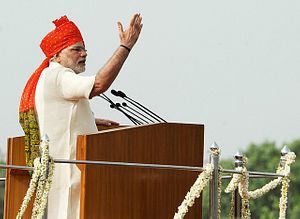The India-Pakistan confrontation over the terrorist attack on Indian troops in Pulwama does not appear to be easing just yet. After the Indian air strike on a Jaish-e-Mohammad terrorist camp in Pakistan, the Pakistan Air Force (PAF) retaliated by bombing several “non-military” targets across the Line of Control.
What happened subsequently is a bit hazy, but it appears that at least one Indian MiG-21 fighter was shot down as it chased the PAF fighters away, with the pilot falling into Pakistan’s hands. India has demanded that he be handed over. Paradoxically, this could be a blessing in disguise as it provides an avenue for both sides to deescalate the crisis.
On the other hand, the current situation does put Indian Prime Minister Narendra Modi on the horns of a dilemma. He has incentives both to escalate and climb down, and the stakes for him are the upcoming elections.
The incentives to escalate are clear: if this is where the confrontation ends, India has clearly lost, and the Modi government will be held responsible. Already Indian opposition parties are blaming the government for the situation India finds itself in. Twenty-one of these parties have jointly blamed the government for the “blatant politicization of the sacrifices made by our armed forces by leader of the ruling party”, a clear indication that Modi will be personally targeted if this does not end well for India. With barely a couple of months left for polls in India, it will be difficult for him to spin this as an Indian victory if this is where it ends. Moreover, it strikes at the root of the Modi persona as a strong man, and as a decisive leader.
The other strong incentive for India to escalate is the strategic equation if the crisis ends now. The Balakot strike was designed to demonstrate that India had the upper hand because of its conventional military superiority and that it had the space to escalate if it wanted to. If India had been able to do this successfully, it could have fundamentally changed the India-Pakistan dynamic, because it could have set up a template for future Indian military action. By the same token, an Indian failure does not return the situation to status quo ante, but to a much worse place for India. It would reinforce Pakistan’s deterrence logic, tie India’s hands in future confrontations, and give Pakistan a free hand to continue with its strategy of using terror against India. It would have been better for India to not have launched the Balakot attack at all because India’s conventional deterrence, such as it is, will lie in tatters.
Set against these are two disincentives for escalation, again one political and the other strategic. The political one is that after this taste of the unexpected turns in a test of arms, Modi will have to worry about whether he can trust the Indian military to carry out subsequent actions successfully. Further confrontation carries with it the possibility of retrieving the situation but equally, further risk that the situation could get worse. Though it is reasonably certain that India will come out on top in a long drawn out fight, a long drawn out fight itself would be humiliating for a country that is by many orders larger and more powerful. Modi will find it difficult to go campaigning if India has not won decisively, and the risk of escalation is that there will be no immediate or decisive victory.
A second disincentive for escalation is that India may not have militarily prepared for this confrontation. Doubling down on escalation with a military force that is not ready is a recipe for disaster. The Modi government has only itself to blame, having paid little attention to the military and starved it of funds to the point that it is not certain that it would perform much better if the situation worsens. The unpreparedness provides a good disincentive for further escalation because of the uncertainty.
It is not clear in which direction Modi will push. But beyond this iteration of India-Pakistan confrontation, this should hopefully demonstrate to Indian political leaders that they need to pay greater attention to military and security matters than they have hitherto and make the necessary adjustments before a crisis hits rather than after.
Dr. Rajeswari Pillai Rajagopalan is Distinguished Fellow and Head of the Nuclear and Space Policy Initiative at the Observer Research Foundation. Professor Rajesh Rajagopalan is Professor of International Politics at Jawaharlal Nehru University, New Delhi.

































